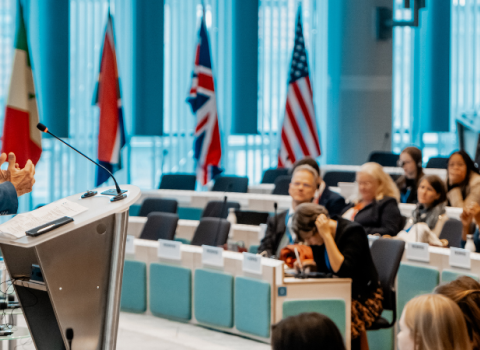The EU must grasp the opportunity to get Europe on the front foot in scientific and technological innovation

Tim Bedford (left), vice president of CESAER, and Malte Lohan, director general of Orgalim.
With the push to implement an EU industrial policy that will make our industries more competitive, and as attention turns to designing the next research framework programme, the opportunity to revive Europe’s leadership in cutting-edge science and technology is here and now.
It’s no exaggeration to claim that Europe has a rich history of scientific and technological innovation. From the invention of the printing press to the discovery of the Higgs boson, the continent has been at the forefront of human progress.
But in recent years, there has been a shift in the global innovation landscape. Other regions, notably Asia and North America, have made significant strides, while Europe’s leadership has slipped.
As representatives of European universities and industries, we are now calling for the EU to make up for this lost ground, by rebooting the research and innovation ecosystem.
EU funding for research and innovation, mostly through Horizon Europe, plays a crucial role in supporting, energising and developing this ecosystem. But as things stand, the budget is not big enough and a substantial boost is needed, today and tomorrow.
In addition to more funding, the increasingly complex landscape means the next EU framework programme for research and innovation FP10, must have a laser-sharp focus on the areas in which it excels: in supporting excellence across the whole knowledge value chain, from initial basic research, to late-stage scale-up and commercialisation.
This includes boosting research collaborations between universities and industries in areas where Europe has the potential to lead, such as green technologies, advanced materials, advanced manufacturing, biotechnologies, digital transformation, electrification and deep tech.
These are not only areas of strategic importance, but they will also drive economic growth, competitiveness and societal progress.
Hand in hand with this, we need to do more to foster a culture of innovation and entrepreneurship. Our universities and industries are brimming with ideas and talented people and we need to create an environment where these resources can be translated into products and services that can compete globally.
Our entrepreneurial talent requires capital, but alongside funding, companies forging new products also need supportive regulation that encourage innovation and a risk-taking mindset. Regulatory frameworks must adopt an innovative approach to support early-stage technologies in navigating regulatory pathways, in addition to a review of unnecessary regulatory hurdles.
We also need to invest in our people. Europe has some of the world’s best scientists and engineers and we must ensure they have the resources and opportunities to excel. This means not only providing funding for research, training and skills development, but also creating high quality career pathways.
In calling on the EU to substantially increase funding for research and innovation, we want to underline that this is a call to invest in the future, in our ability to address the pressing challenges of our time, and to be a leader in a world that more than ever, will be shaped by science and technology.
Tim Bedford is vice president of CESAER, an association of universities of science and technology in Europe.
Malte Lohan is director general of Orgalim, an association of Europe's technology industries





 A unique international forum for public research organisations and companies to connect their external engagement with strategic interests around their R&D system.
A unique international forum for public research organisations and companies to connect their external engagement with strategic interests around their R&D system.